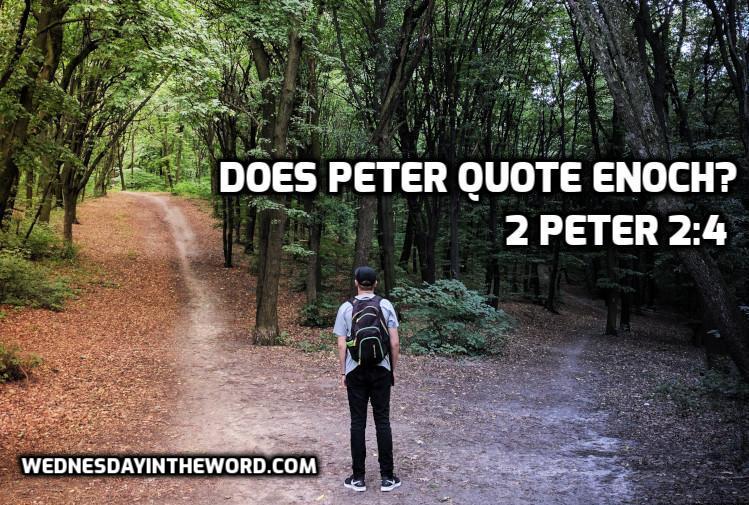Does Peter quote Enoch? Why would an apostle quote a non-biblical source? Find out in this episode of Wednesday in the Word.
Review
Peter is writing to churches which are troubled by false teachers. These false teachers are distorting the apostolic gospel and deceiving believers into leading immoral lives. In chapter 1 Peter insisted that the apostolic gospel is a revelation from God and that believing the gospel results in a lifestyle marked by a pursuit of godliness. In chapter 2 he turns his attention directly on the problem of false teachers, although I believe he had the false teachers in view from the start.
2Peter 2:4-10a is 1 sentence in the original Greek. This podcast covers only the interpretative challenges of 2:4. The next podcast covers the sentence itself.
Passage
4For if God did not spare angels when they sinned, but cast them into hell and committed them to chains of gloomy darkness to be kept until the judgment; 5if he did not spare the ancient world, but preserved Noah, a herald of righteousness, with seven others, when he brought a flood upon the world of the ungodly; 6if by turning the cities of Sodom and Gomorrah to ashes he condemned them to extinction, making them an example of what is going to happen to the ungodly; 7and if he rescued righteous Lot, greatly distressed by the sensual conduct of the wicked 8(for as that righteous man lived among them day after day, he was tormenting his righteous soul over their lawless deeds that he saw and heard); 9then the Lord knows how to rescue the godly from trials, and to keep the unrighteous under punishment until the day of judgment, 10and especially those who indulge in the lust of defiling passion and despise authority. – 2 Peter 2:4-10a
The main point is fairly easy to see. This is an “If-then” clause. The “If” clauses are
- 2:4 For if God did not spare the angels when they sinned
- 2:5 if he did not spare the ancient world
- 2:6 if he did not spare Sodom and Gomorrah
- 2:7 if he rescued righteous Lot
- 2:9 THEN the Lord knows how to rescue the godly from trials, and to keep the unrighteous under punishment until the day of judgment
He said in 2Peter 2:3 the condemnation of the false teaches is not idle and neither is their destruction asleep. 2Peter 2:4-10 contains his historical proof.
2Peter 2:4 For if God did not spare angels when they sinned, but cast them into hell and committed them to chains of gloomy darkness to be kept until the judgment;
Jude 1:6 And the angels who did not stay within their own position of authority, but left their proper dwelling, he has kept in eternal chains under gloomy darkness until the judgment of the great day–
What story are Peter and Jude referencing?
- Peter and Jude appear to be quoting from the book of 1Enoch which is part of the psuedepigrapha.
- 1Enoch is a fictional story based on Genesis 6, which assumes the “sons of God” are fallen angels, the “daughters of men” are human women and the “nephilim” are a mighty race born from this union. In the Enoch story, God judges the fallen angels. This view was the popular understanding because of this fictional genre that includes 1Enoch.
- The author claims to be Enoch, the son of Jared, the father of Methuselah (Genesis 5:21-22; Luke 3:37; Hebrews 11:5; Jude 1:14).
- 1Enoch is not part of the Old Testament in either the Protestant or Catholic Bibles.
- The text of the Book of Enoch
- What is the Book of Enoch?
- Article on Genesis 6: Who were the Nephilim (Answers in Genesis)
Do Peter and Jude actually quote 1Enoch?
- Jude explicitly quotes from 1Enoch in 1:14, even naming the book.
- The details both Peter and Jude give all find an echo in the book of 1Enoch.
- Yes, they appear to quote 1Enoch.
Why would Peter and Jude quote 1Enoch?
Arguments I reject:
- Peter & Jude quote Enoch because they believe it to be true, but Peter & Jude were wrong.
- Peter & Jude quote some other document we don’t have today. For example, Peter and Jude are referencing Isaiah 14:12-17 and/or Ezekiel 28:11-9, which refer may refer to the fall of Satan.
- Peter and Jude are quoting Enoch because they believe it to be true and it is true.
I have argued that Peter wrote first and Jude is quoting Peter. Thus Jude quotes Enoch because Peter does.
I think Peter and Jude both quote from the fictional book of 1Enoch. I think both Peter and Jude believe that book to be part of the popular fiction of the day and that they quote it as fiction, the way a teacher today might quote Star Wars or Harry Potter. I think they quote it to use popular culture to further the larger point of the sentence that God judges those who rebel against him.
Please listen to the podcast for more detail and explanation.
Next: 08 2Peter 2:5-10 The Certainty of Judgment
Previous: 06 2Peter 2:1-3 Why 2 Peter 2 and Jude are so similar
Series: 2Peter: How to find Life
Study: 2Peter Resources
Photo by Vladislav Babienko on Unsplash

